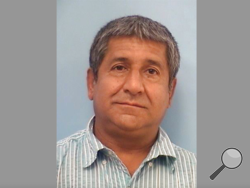The ambush killings of four Muslim men in Albuquerque, New Mexico, shook the community but inspired a flood of information, including a tip that led to the arrest of a local Muslim man originally from Afghanistan who knew the victims, authorities said.
Muhammad Syed, 51, was arrested on Monday after a traffic stop more than 100 miles (160 kilometers) away from his home in Albuquerque. He was charged with killing two victims and was identified as the prime suspect in the other two slayings, authorities announced Tuesday.
The Muslim community is breathing “an incredible sigh of relief,” said Ahmad Assed, president of the Islamic Center of New Mexico. “Lives have been turned upside down.”
It wasn’t immediately clear whether Syed had an attorney to speak on his behalf.
The first killing last November was followed by three more between July 26 and Aug. 5.
Police Chief Harold Medina said it was not clear yet whether the deaths should be classified as hate crimes or serial killings or both.
Syed was from Afghanistan and had lived in the United States for about five years, police said.
“The offender knew the victims to some extent, and an interpersonal conflict may have led to the shootings,” a police statement said, although investigators were still working to identify how they had crossed paths.
When asked specifically if Syed, a Sunni Muslim, was angry that his daughter married a Shiite Muslim, Deputy Police Cmdr. Kyle Hartsock did not respond directly. He said “motives are still being explored fully to understand what they are.”
Assed acknowledged that “there was a marriage,” but he cautioned against coming to any conclusions about the motivation of Syed, who occasionally attended the center’s mosque.
Police said Syed gave them a statement but didn't disclose details.
The slayings drew the attention of President Joe Biden, who said such attacks “have no place in America.” They also sent a shudder through Muslim communities across the U.S. Some people questioned their safety and limited their movements.
“There is no justification for this evil. There is no justification to take an innocent life," Nihad Awad, executive director of the Council on American–Islamic Relations, said at a Tuesday news conference in Washington, D.C.
He called the killings “deranged behavior."
The earliest case involves the November killing of Mohammad Ahmadi, 62, from Afghanistan.
Naeem Hussain, a 25-year-old man from Pakistan, was killed Friday night. His death came just days after those of Muhammad Afzaal Hussain, 27, and Aftab Hussein, 41, who were also from Pakistan and members of the same mosque.
Ehsan Chahalmi, the brother-in-law of Naeem Hussain, said he was “a generous, kind, giving, forgiving and loving soul that has been taken away from us forever.”
For now, Syed is charged in the killings of Aftab Hussein and Muhammad Afzaal Hussain because bullet casings found at the crime scenes were linked to a gun found at his home, authorities said.
Investigators consider Syed to be the primary suspect in the deaths of Naeem Hussain and Ahmadi but have not yet filed charges in those cases.
The announcement that the shootings appeared to be linked produced more than 200 tips, including one from the Muslim community that police credited with leading them to the Syed family.
Police said they were about to search Syed’s Albuquerque home on Monday when they saw him drive away in a Volkswagen Jetta that investigators believe was used in at least one of the slayings.
Officers followed him to Santa Rosa, about 110 miles (177 kilometers) east of Albuquerque, where they pulled him over. Multiple firearms were recovered from his home and car, police said.
Syed’s sons were questioned and released, according to authorities.
Prosecutors expect to file murder charges in state court and are considering adding a federal case, authorities said.
Shiites make up the second largest branch in Islam after Sunnis.
Aneela Abad, general secretary at the Islamic center, said the two Muslim communities in New Mexico enjoy warm ties.
“Our Shiite community has always been there for us and we, Sunnis, have always been there for them,” she said.
Muhammad Afzaal Hussain had worked as a field organizer for Democratic Rep. Melanie Stansbury’s campaign.
“Muhammad was kind, hopeful, optimistic,” she said, describing him as a city planner “who believed in democracy and social change, and who believed that we could, in fact, build a brighter future for our communities and for our world.”
___
Dazio reported from Los Angeles and Fam from Winter Park, Florida. Associated Press writer Robert Jablon in Los Angeles contributed to this report.

